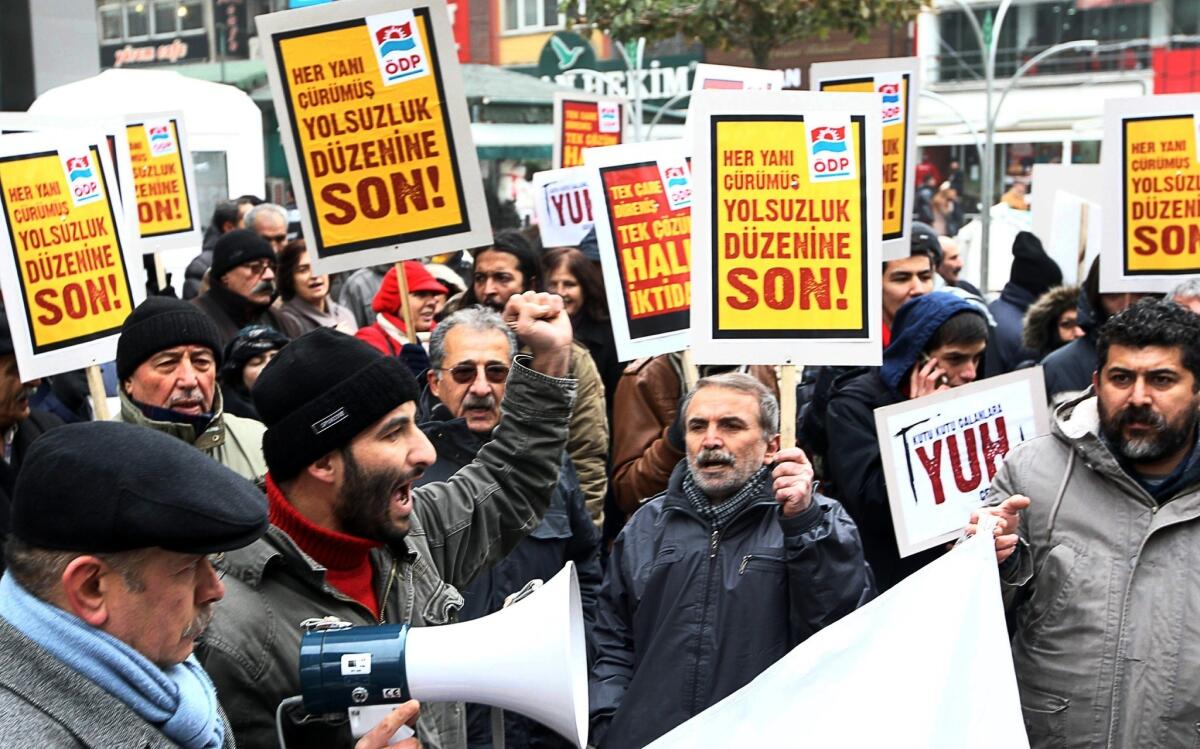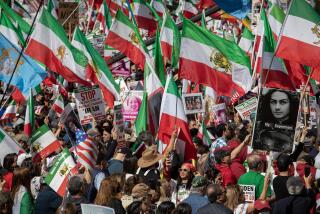Corruption scandal, police firings spark renewed unrest in Turkey

- Share via
A new wave of street protests has flared in Istanbul following the arrest on graft charges of two dozen banking figures with close ties to the Turkish government.
The raid on those suspected of corruption prompted Prime Minister Recep Tayyip Erdogan to sack the police investigators involved and accuse them of being part of a “smear campaign” provoked by a U.S.-based Muslim cleric.
The sons of two of Erdogan’s Cabinet members were among those arrested last week after Turkish media showed video of police hauling shoeboxes stuffed with millions of euros out of the homes of senior officers of state-run lender Halkbank.
The corruption allegations and the response of the Erdogan government to punish and shackle police and prosecutors has rekindled the tense and violent atmosphere that prevailed in Istanbul and other major cities during the spring, Turkish newspapers reported Monday.
“Blinded with rage over the investigation that implicates key ministers in a massive corruption scandal, Prime Minister Recep Tayyip Erdogan is on the warpath,” the daily Hurriyet said in a scathing commentary. True to his nature, the commentary said, Erdogan is “claiming that he is faced with a conspiracy by domestic and international forces.”
Erdogan warned unnamed “ambassadors” against inciting antigovernment sentiment in Turkey, a reference the newspaper said was aimed at U.S. Ambassador Francis J. Ricciardone, said by pro-government media to have cast the corruption scandal as evidence that Erdogan’s 11-year rule is collapsing.
Police superiors with close ties to the administration were kept in the dark about the corruption investigation, and Erdogan responded by firing a reported 70 police officials and unleashing “a witch hunt against the same police force he was praising sky high during the Gezi protests,” Hurriyet said.
Gezi Park in central Istanbul was the front line of deadly confrontations that began in late May between police and antigovernment protesters angered by the bulldozing of trees in a rare venue of greenery in the teeming city. The park was cleared to make way for a high-rise project that had been rejected by city planners but resurrected by Erdogan as part of his vision for a modernized city at the crossroads of Europe and Asia. Five people were killed and more than 8,000 were injured in the showdown, which paralyzed Istanbul’s central Taksim Square for nearly three weeks.
On Sunday, police again used tear gas and water cannons to disperse thousands of demonstrators demanding the government’s resignation over the corruption scandal. They were angered, local media said, by Erdogan’s attempt to blame the latest antigovernment sentiment on Muslim cleric Fethullah Gulen, who lives in Pennsylvania.
Gulen, whose Hizmet movement has at least a million followers and wields broad influence with law enforcement and the judiciary in Turkey, lashed out at Erdogan and his government allies for their reaction to the corruption arrests, the Reuters news agency reported.
During Friday prayers, Gulen was said to have appealed that “God bring fire to their houses.”
Erdogan struck back in rallies with supporters over the weekend, calling the corruption probe a “smear campaign” against his ruling Justice and Development Party, Agence France-Presse reported from Ankara, the capital.
A Cabinet shakeup is expected as the prime minister maneuvers to deflect responsibility for the alleged graft away from his offices, Hurriyet said, adding that 10 government ministers were expected to be dismissed.
A purge of some key government officials had been planned anyway, in preparation for March elections in which some senior government figures plan to run for local and regional offices.
Twitter: @cjwilliamslat
More to Read
Sign up for Essential California
The most important California stories and recommendations in your inbox every morning.
You may occasionally receive promotional content from the Los Angeles Times.











